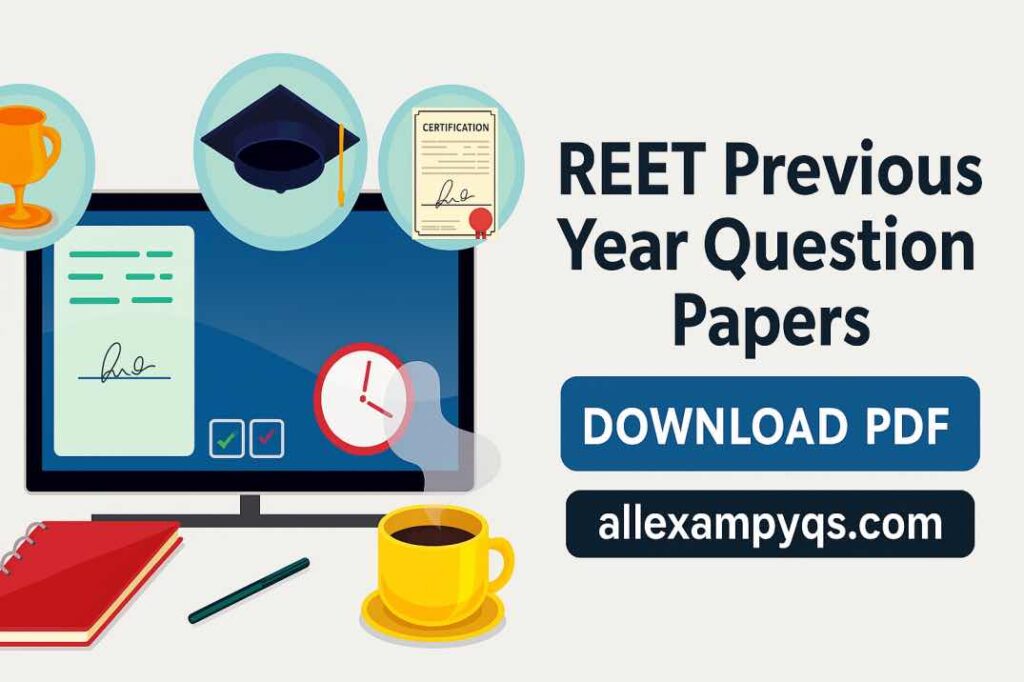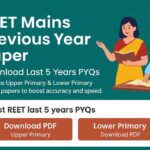📅 Published on: 12.11.2025
Table of Contents
ToggleREET Previous Year Question Papers – Download Pdf

If you are preparing for the Rajasthan Eligibility Examination for Teachers (REET), solving REET previous year question papers is one of the most effective ways to boost your score. These papers help you understand the exam pattern, syllabus coverage, and types of questions asked in both Level 1 (Class 1–5) and Level 2 (Class 6–8) exams. Practicing with old papers enhances your accuracy, speed, and confidence — three key factors to crack REET successfully.
REET Exam Pattern 2025
The REET exam is conducted by the Rajasthan Staff Selection Board (RSMSSB). It consists of two levels:
Level | Classes | Subjects | Total Marks | Duration |
Level 1 | Class 1–5 (Primary Teachers) | Child Development & Pedagogy, Language I, Language II, Mathematics, Environmental Studies | 150 | 2.5 hours |
Level 2 | Class 6–8 (Upper Primary Teachers) | Child Development & Pedagogy, Language I, Language II, Mathematics & Science / Social Studies | 150 | 2.5 hours |
Download REET 2022 Level 1 and Level 2 Question Papers (PDF)
Below is a complete table to download REET previous year question papers in PDF format for both Level 1 and Level 2:
Exam Name | Download PDF |
REET Level 1 Shift 1 | |
REET Paper 2 Shift 2 | |
REET Level 2 Shift 3 | |
REET Level 2 Shift 4 |
REET Previous year Question paper 2019
Download REET 2019 Level 1 and Level 2 question papers to boost your preparation.
Practicing these papers will help you understand question trends and difficulty level.
Exam Name (2019) | Code A (Download PDF) | Code B (Download PDF) |
REET 2019 Level 1 (Primary) | ||
REET 2019 Level 2 (Upper Primary) |
TET PYQ
REET Syllabus 2025
Understanding the REET syllabus 2025 is crucial before starting preparation. The syllabus for Level 1 and Level 2 slightly differs:
Level 1 (Primary Teacher)
- Child Development and Pedagogy
- Language I (Hindi / English / Sanskrit / Urdu)
- Language II
- Mathematics
- Environmental Studies
Level 2 (Upper Primary Teacher)
- Child Development and Pedagogy
- Language I & II
- Subject-specific section:
- Mathematics & Science (for Science teachers)
- Social Studies (for Social Science teachers)
Important Topics from REET Previous Year Question Papers
By analyzing REET previous year question papers, experts have identified these important topics:
- Child Development: Piaget, Kohlberg, and Vygotsky theories, Learning and Motivation
- Language I & II: Grammar, Comprehension, Pedagogy of Language
- Mathematics: Number System, Geometry, Measurement, Pedagogy of Math
- EVS/Social Studies: Indian Geography, History, Environment, and Teaching Methods
- Science: Motion, Energy, Life Processes, Environmental Science
REET Previous Year Cutoff (Last Year)
Category | Level 1 Cutoff (Out of 150) | Level 2 Cutoff (Out of 150) |
General | 118-125 | 120-127 |
OBC | 112-118 | 115-121 |
SC | 105-110 | 108-114 |
ST | 100-107 | 104-110 |
EWS | 110-117 | 114-120 |
Best Books for REET Preparation
Here are some recommended books based on previous toppers’ suggestions:
Subject | Best Book | Author / Publisher |
Child Development & Pedagogy | CTET & TETs Child Development and Pedagogy | Arihant Experts |
Language (Hindi/English) | Language Pedagogy | Arihant / Disha Publication |
Mathematics | Quantitative Aptitude | R.S. Aggarwal |
EVS / Science / SST | NCERT Books (Class 3-8) | NCERT |
Practice Papers | REET Solved Papers | Lucent / Arihant |
Expert Preparation Tips for REET Exam
1. Understand the Exam Pattern
Before beginning your preparation, go through the REET exam pattern and marking scheme carefully. Analyze REET previous year question papers to identify question trends and topic weightage for each subject. This helps you focus on important areas like Child Development, Language, and Pedagogy. Understanding the structure also ensures you allocate time wisely during the exam. A clear grasp of the paper format builds confidence and reduces surprises on exam day.
2. Study NCERT Books
The majority of REET questions are directly or indirectly based on NCERT textbooks (Classes 3–8). These books provide a strong conceptual foundation in subjects like Mathematics, Environmental Studies, and Science. Read them thoroughly, underline key points, and solve all in-text and exercise questions. NCERT examples often resemble real REET exam questions, making them the most authentic study source. Don’t skip basic definitions and pedagogy-related explanations provided in NCERT chapters.
3. Make Short Notes
While studying, prepare short, concise notes for every subject. Include key formulas, definitions, teaching principles, and frequently asked topics. Writing notes improves retention and helps in quick revision during the final days before the exam. Keep them organized subject-wise so you can revise 3–4 subjects daily in rotation. Regularly updating your notes as you study new topics ensures your revision material stays relevant and complete.
4. Attempt Mock Tests
Mock tests simulate the real exam environment and help improve speed, accuracy, and time management. Attempt one full-length test every week and analyze your performance afterward. Identify your weak areas and revise those topics before taking the next test. This practice also enhances your mental stamina for the 2.5-hour paper. By solving online or offline mock tests, you get comfortable with the pattern and pressure of the actual REET exam.
5. Revise Pedagogy Topics Regularly
Pedagogy forms a major portion of both Level 1 and Level 2 REET papers. Concepts like learning theories, teaching methods, classroom management, and assessment techniques are frequently repeated. Revise these topics weekly and solve pedagogy-related MCQs from previous papers. Understanding the psychology of learners helps in tackling tricky questions easily. Regular revision ensures you don’t forget essential points during the final preparation phase.
6. Focus on Accuracy
Since REET has no negative marking, accuracy and attempt rate play a vital role. Practice solving questions carefully without rushing, ensuring that each answer is logical and factually correct. Focus on understanding concepts rather than rote memorization to avoid silly mistakes. When revising, attempt previous year papers within a time limit to develop exam discipline. Confidence and accuracy together can significantly boost your final score.
Conclusion
Practicing REET previous year question papers is the most reliable way to understand the exam’s pattern and difficulty level. It not only helps in revision but also builds exam-day confidence. Combine regular practice with smart study and revision to ace the REET 2025 exam and secure your dream teaching post in Rajasthan.
FAQs – REET Previous Year Question Papers
Q1. Where can I download REET previous year question papers?
You can download them in PDF format from official sources like the RSMSSB website or trusted educational portals such as allexampyqs.com.
Q2. Are REET Level 1 and Level 2 question papers different?
Yes, Level 1 is for Primary Teachers (Classes 1–5) and Level 2 is for Upper Primary Teachers (Classes 6–8).
Q3. How many marks are required to qualify REET?
General candidates need around 60%, and reserved category candidates require 55% to qualify.
Q4. What is the best way to prepare for REET 2025?
Start with the syllabus, practice REET previous year question papers, take mock tests, and revise pedagogy concepts regularly.
Q5. Is there any negative marking in the REET exam?
No, there is no negative marking, so attempt every question.


